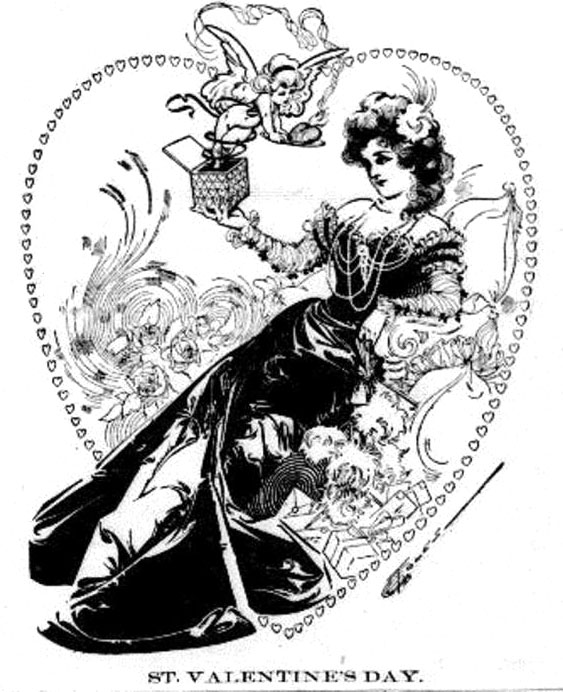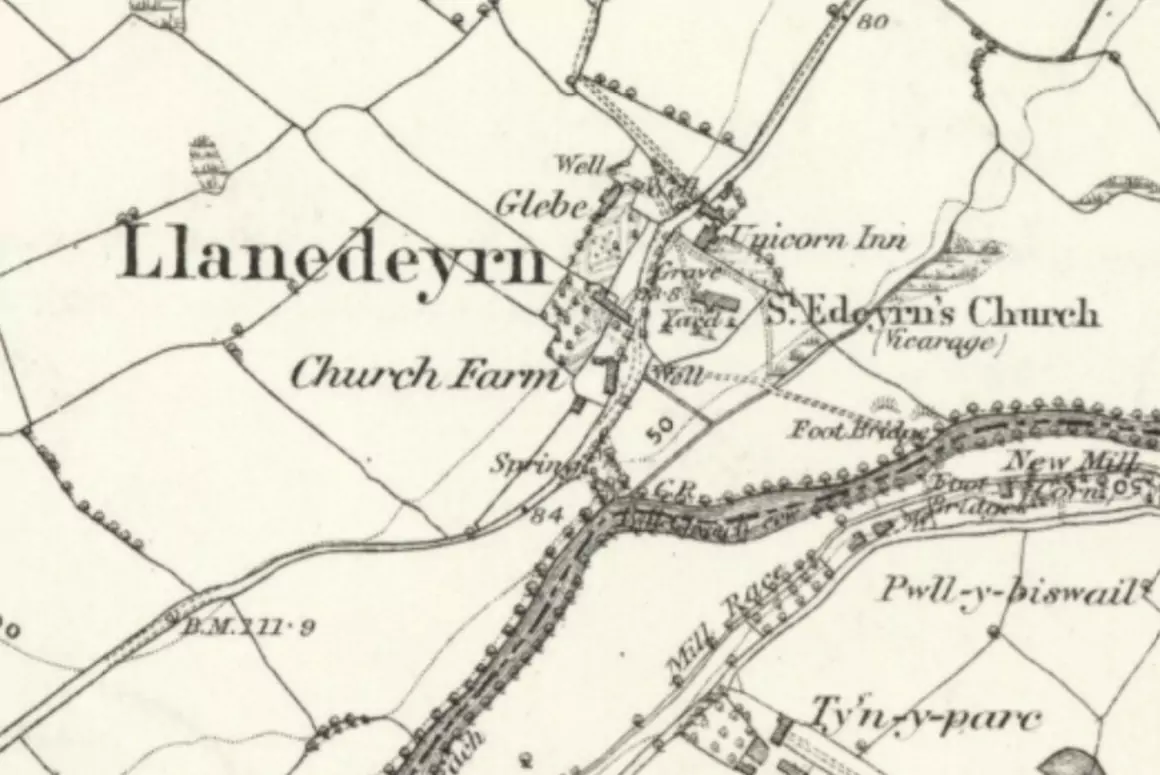![]()
In the early nineteenth century, Valentine’s Day was just about the most important day of the year. It provided an enormous boost to the income of local printers, anxious to exploit the exciting demand for greetings cards by providing the perfect solution to unimaginative males. Instead of young men having to compose some awful sentimental verse for themselves, they could buy a card with a dreadful verse already inside. These were called ‘mechanical valentines’ and soon involved lace and ribbons and frilly edges, naturally the better to convey undying love. All this happened in spite of high postage costs and, of course, when these were reduced in 1840, with the introduction of the penny post, the number of valentines in badly-scented envelopes soared. A year later almost half a million cards were sent, since now it was possible for the indecisive male to dispatch any number of anonymous messages.
In Swansea in 1866, the number of letters delivered on Valentines’ day (there were three delivery rounds) was such that the total was the equivalent of one letter for every person who lived in the town, man woman and child. The Cambrian newspaper felt compelled to point out that ‘a great many, we blush to say, had been posted without the adhesion of her Majesty’s profile.’ Ah yes, in Swansea it was ever thus. Sadly, the reaction of the young woman who received a kipper along with her card, was unreported.

By 1878, the Swansea Post Master urged romantics to post early. The postmen are over-burdened on such occasions, he said, and ‘unless the public choose to assist them by going early to the post, delay and disappointment are the inevitable result.’
The blame was clearly assigned to the development of a proper postal system, which made the dispatch of anonymous cards an economic option and, given the nature of some of the verses within them, anonymity had significant advantages. It is quite clear to me that woeful ballads dedicated solely to your beloved’s eyebrows might not do the job, whatever the job was, that you thought it might do. The press too, was full of poems to celebrate a day on which the requirements for talent and inspiration had long since been abandoned.

To be honest, you wouldn’t wrap a kipper in it.
I can confirm that there was no improvement over time and, in these newspaper verses, you can observe a shocking decline in poetic standards, even though you never thought such a thing could be possible. The Cardiff Times in 1878 took a rather contemptuous view of the verses in cards calling them ‘the inanities of undisclosed affection,’ an opinion which you would have carried rather more conviction if the press hadn’t been publishing similar rubbish on their own pages. This particular example comes from the Cardigan Observer in 1880.
While bright thoughts fade, bright hopes grow vain
One thing your poet knows is,
We shall be boy and girl again
In some metempsychosis.
I wonder where, 0 Mistress mine!
We next shall meet Saint Valentine.
It is best if you don’t try and unpick that lot. Life is much too short.
But human nature being what it is, it is impossible to expect people to continue to take the whole ridiculous business seriously and so it was inevitable that there would be a reaction. It is, after all, reflected The Cardiff Times, ‘a mad world that we live in.’ Valentine’s Day no longer confined itself to ‘the divine questions of love,’ that ‘exercised the minds and tested the pockets of amorous juveniles.’ It had all become rather vulgar.
‘Provision is made almost as lavishly for causing pain and annoyance. Lampooning seems to be upon the increase and we hope that a large proportion of the vulgar and disgusting productions exhibited in unredeemed hideousness by tradesmen, are left upon their hands.’
Now those are the cards I would like to see. But the newspaper continues to shakes its editorial head at foolish modern ways.
‘There was a time when the valentine was a greater favourite than the Christmas card. It was the day when love-sick maids and youths were expected to make known their passion. Now it occupies as little attention as the Easter card. Fashion has pronounced the death warrant of the valentine, and so it must go. It has existed merely for fifth-rate caricaturists to expose the foibles of the human race with gross pencils and gaudy colouring.’
And whilst we can speculate that the editor didn’t send out too many cards himself, issues of quality and refinement didn’t trouble Mr Jonathan King, of Essex Road, Islington at all.
He is the possessor of the largest collection of Christmas cards and now has about 150,000 valentines carefully indexed and arranged in 250 volumes. An old favourite is a small mirror with orange-blossoms round it and underneath: “Take but a peep and you will see, One that the world holds dear to me.”
Every old man needs a hobby, I suppose. But even so…You might be pleased to learn that Mr King ‘has offered the unique collection, worth some thousands of pounds, to the British Museum.’ However, I am sure I have not seen the collection yet and I have been a few times.
The celebration of Valentine’s Day unexpectedly imploded in 1888, when deliveries collapsed and then faded significantly through the nineties, never to return, in the respected opinion of the Cardiff Times .
‘To- day there is scarcely anything left of the valentine except those hideous, sarcastic cartoons of spinsterdom and bachelorhood, garishly coloured and frightfully drawn, which appear in small windows in back streets, and are, no doubt, purchased by wags intent on a joke at the expense of another’s annoyance.’
Thank goodness such an idea doesn’t have any mileage in the twenty first century. The editor is horrified at how far the expression of love has fallen. The dying embers of Valentine’s Day glowed only with vulgarity.
‘In some future age it may be revived, just as society revives the fashions of our great- grandfathers and great-grandmothers, but this is hardly likely. When an old custom dies, it disappears for ever.’
Very perceptive, I think. Our sophisticated life in the twenty first century no longer has patience with vulgarity. Does it?






